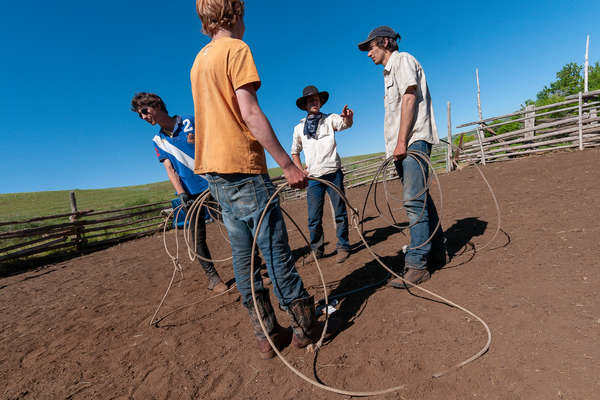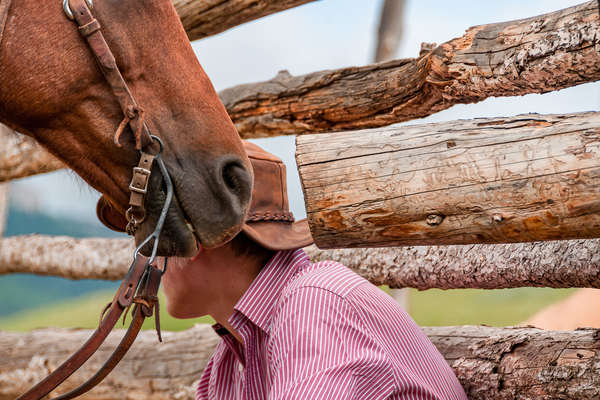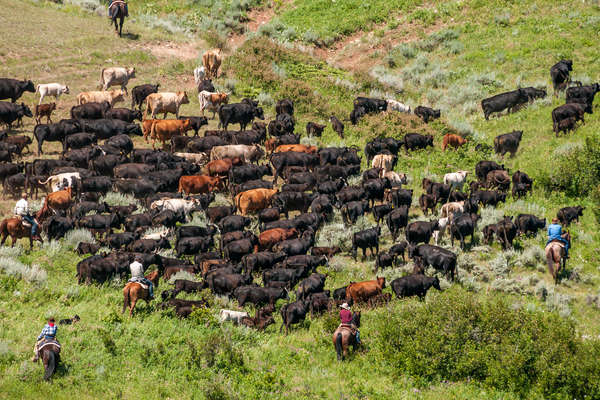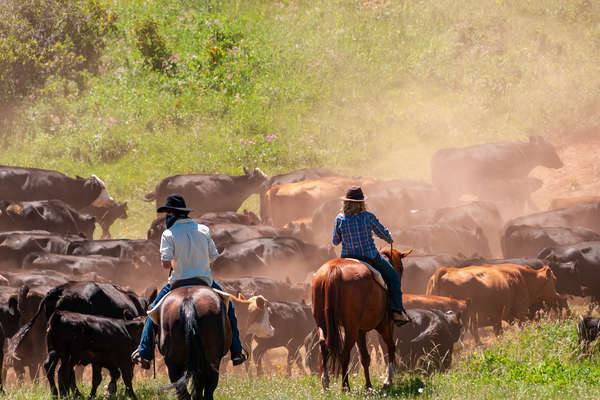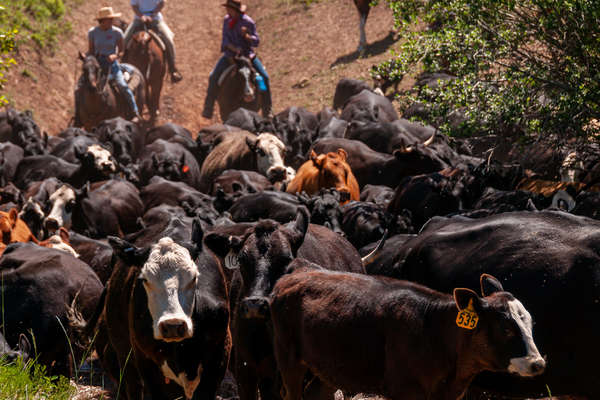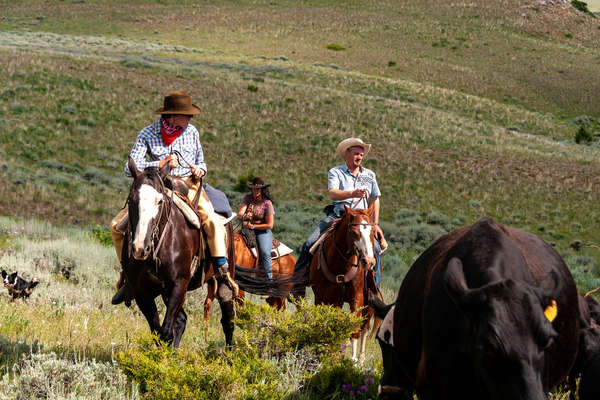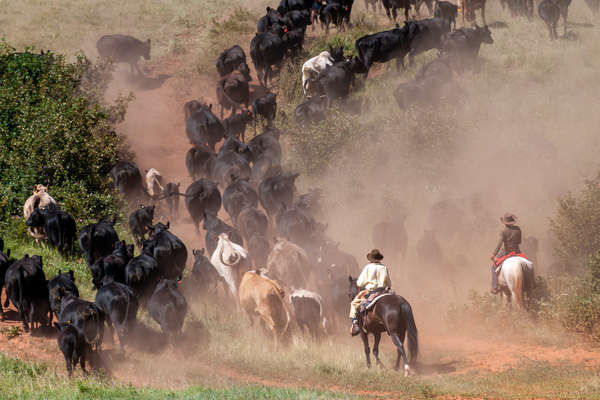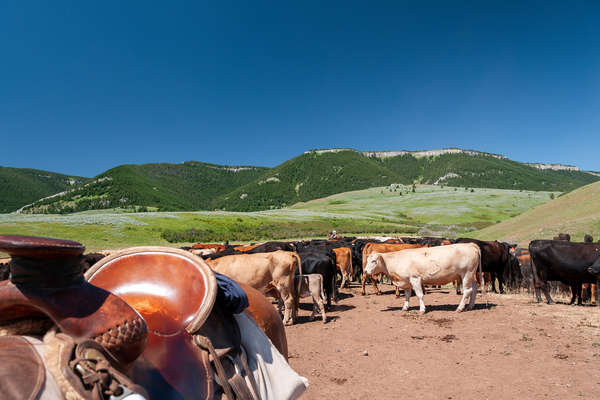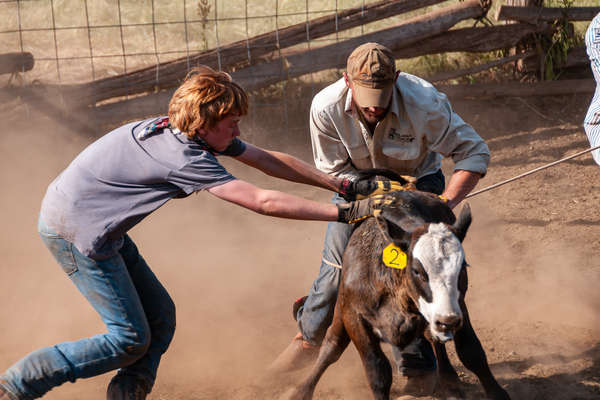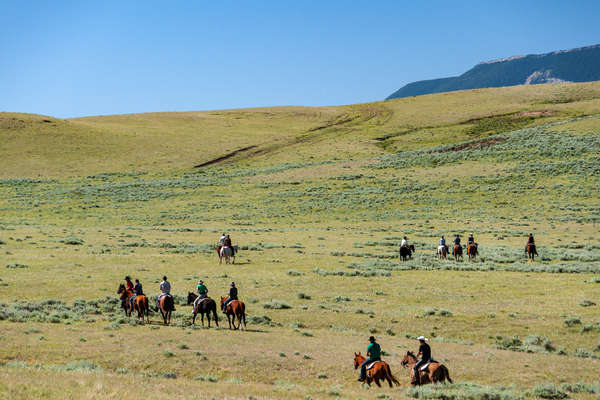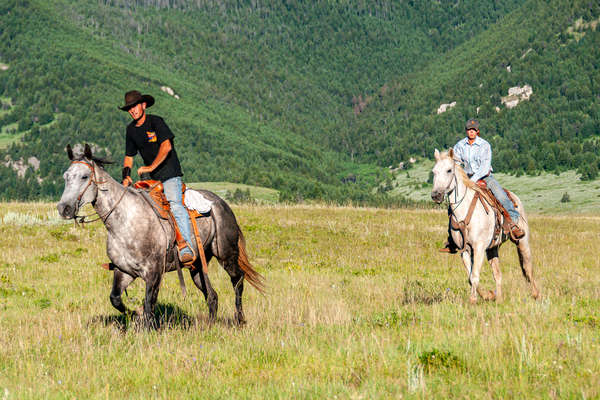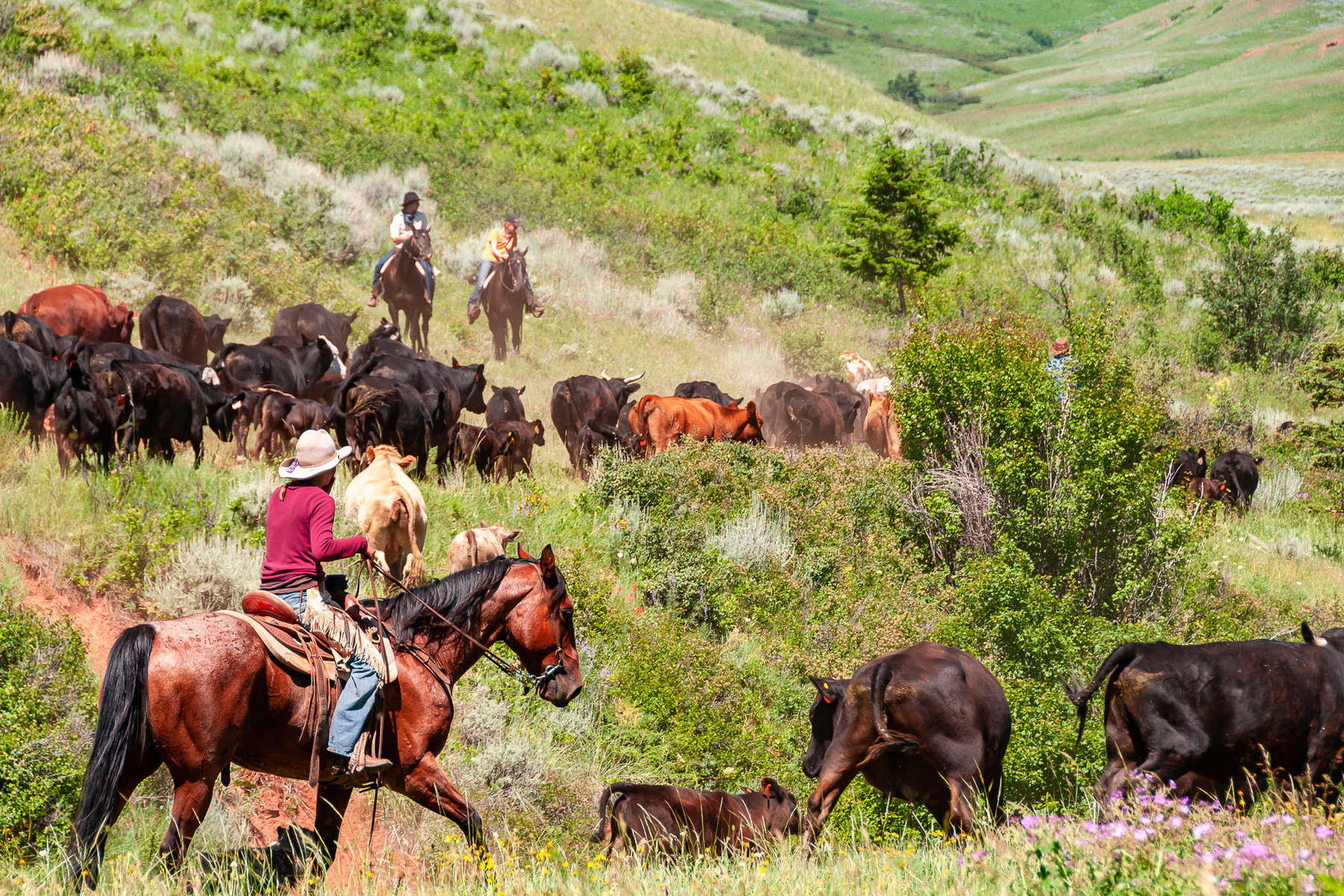
Itinerary
Highlights
- A warm welcome awaits you from the Tylett family, ranchers for five generations
- Enjoy the beauty of the vast Pryor Mountains and the Big Horn Canyon
- There are 1200 head of cattle to collect and move to or from a wild camp high up in the mountains
- Wholesome, home cooked, ranch style meals
Dates & prices
Price details
- International flights are not included. Expect to pay around £700 - £1200 depending on you departure dates and the airport from which you will be flying
- Your nights in Billings are not included. You can choose to book your own hotel, or we will be happy to add this to your quotation.
- The group size is usually max. 18 riders
- There is no possibility of a single person tent, except in exceptional circumstances
- Return transfers to and from Billings, Montana are included within the listed price
- Gratuities are not included and are expected (around 15% is customary)
- An electronic travel authorisation (ESTA) is required to enter the USA. It is your responsibility to organise this. Please visit https://esta.cbp.dhs.gov/ and contact us if you need help.
- Extension : From the ranch, with only a few hours by car, you can reach some areas of incredible natural beauty, such as Yellowstone National Park, Grand Teton, Cody etc.. If you wish, we can help you to organise an extension to your trip to visit some of those places. We can arrange both your accommodation and hire car for you if you wish
Please Note
The itinerary may be modified at anytime for security reasons, meteorological or events beyond our control such as blocked roads, rivers in flood, drought, strikes and local holidays. Equus Journeys, our local partners and their local guides will always strive to find the best solution and will alter the itinerary as needed.
The names of the hotels and accommodation are given for information only and depending on availability, they may be modified without notice and replaced by another of a similar standard.
Price includes
Support Team
Logistic
Inland transports
Accommodation
Meals
Additional equipment
Price doesn't include
Meals
Meals in Billings
Accommodation
Transports
International flights bookable on request
Extra
Insurance
Equestrian info
Horses
Guide & local team
Minimum riding ability
Minimum riding ability
Pace
Tacking ability and participation
Trip conditions and Requested experience
Good physical condition is required. The climate is continental, so hot in summer while enjoying the mountain air, cold in the Autumn to very cold and snowy in the winter.
Camping style outbuildings include facilities for showering and toilet. You’ll sleep in outfitter syle canvas wall tents, each with a heat stove, on good sturdy cots with thick foam mattress pads.
Equestrian equipment
- Leather straps to tie your clothes or water bottles.
*We recommend our riders to wear a helmet to the correct standard and you should bring your own to ensure a proper fit.
Additional equipment you might bring (optional):
- Saddlebags
- Spurs
- Gloves (needed for lasso work)
Travel info
Comfort
Meals
- American breakfast - toast, eggs, a choice of sweet and savoury foods, tea and coffee.
- Picnic lunch
- Hot meals at dinner time.
You can drink water at the Camp and fill your water bottles.
Alcohol is not provided but you are welcome to bring your own drinks (that you can purchase at Billings)
Tips
Packing list
- Equus Journeys strongly recommend that you wear a riding helmet and that you take your own to ensure a correct fit. There are many lightweight options available nowadays
- Sunhat for when not riding
- Sunglasses - with a cord attached so they don't fly off when riding
- Buff or bandana
- Warm hat for cold nights when camping
Upper body
- Thermals (long or short sleeved)
- Long sleeved shirts provide protection from the sun and are an extra layer
- T-shirts
- Lightweight fleece or jumper
- Warm fleece or jumper (and a spare in case one gets wet)
- Warm and waterproof jacket - it can rain at any time of year and the evenings can be particularly cold
- Swimming costume - for swimming/bathing in rivers/hot springs
Legs
- Lightweight, comfortable riding trousers or jodhpurs - we recommend riding in them at home before taking them on holiday to ensure they don't rub
- Thermals
Head
- Equus Journeys strongly recommend that you wear a riding helmet and that you take your own to ensure a correct fit. There are many lightweight options available nowadays
- Sunhat for when not riding
-Western riders used to wear a Stetson (American hat). You have usually the possibility to buy one at locally at the beginning of your stay/expedition. Count about 50-120$ for a Stetson. Pay attention that it has to stay on your head when galloping. Ask for a strap/cord to fix it strongly.
- There are some head protections to put under your hat (Ranch & Rider, Lexington Safety Products) or western helmet (Troxel).
- Sunglasses - with a cord attached so they don't fly off when riding
- Buff or bandana
- Warm hat for cold nights when camping
Upper body
- Thermals (long or short sleeved)
- Long sleeved shirts provide protection from the sun and are an extra layer
- T-shirts
- Lightweight fleece or jumper
- Warm fleece or jumper (and a spare in case one gets wet)
- Warm and waterproof jacket - it can rain at any time of year and the evenings can be particularly cold
- Swimming costume - for swimming/bathing in rivers/hot springs/Jacuzzi
Legs
- Lightweight, comfortable riding trousers or jodhpurs - we recommend riding in them at home before taking them on holiday to ensure they don't rub
- Thermals
- Casual trousers for the evenings, such as jeans or tracksuit bottoms
- Waterproof over trousers
Hands and Feet
- Comfortable riding boots. We recommend short boots with half chaps but you may wish to take long chaps as an extra layer against inclement weather. We don't recommend taking your favourite long leather boots in case they get damaged
- Waterproof shoes/boots can be useful for abundant dew in the mornings or when it rains
- Trainers or equivalent light shoes for moving around the camp/ranch in the evenings
- Several pairs of warm, thick socks
- Gloves - your hands are particularly exposed to the sun, cold or rain whilst riding. Waterproof gloves can be particularly useful
Nightwear
- Sleeping bag. You need at least a comfort factor down to minus 5 celsius, but would recommend at least minus 8 or 10 celsius for expedition ride.
- Sleeping bag liner - silk, cotton or fleece - adds an extra layer for expedition ride.
- inflatable mattress (except if camp beds are provided)
- Pyjamas or tracksuits or thermals for sleeping in
Our Recommendations
- Please don't take a hard sided suitcase. Your luggage should be soft sided with a capacity of 80 litres. We recommend taking a backpack or similar.//
- In case of expedition ride : Hard sided suitcase are not permitted on this ride as your luggage is carried by packhorses. It should be soft sided with a capacity of 80-100 litres. We recommend taking a backpack or similar.
- Backpacks cannot be worn whilst riding. We recommend a small bumbag or a coat with pockets so that you can carry small items with you during the day (passport, camera, sunscreen, lip balm etc)
- We recommend travelling in your riding boots and carrying your hat and some riding clothes in your hand luggage - then if your luggage goes astray you are still able to ride!
- Even if foam mattresses are provided, you may pack your inflatable mattress for comfort sake.
Other useful items
- Small backpack for accessing items required during the day (carried by support crew)
- Camera and high capacity memory card. Spare battery
- Bumbag for carrying your camera and small items whilst riding
- Headtorch or small torch for moving around camp at night - bring spare batteries/solar powered battery charger and bulbs
- Water bottle (2 litres or 2 x 1 litre)
- Swiss army knife
- Field glasses
- Ear plugs (for light sleepers)
Expedition ride:
- Towels - camping ones will both dry and pack more easily
- Wet Wipes or equivalent (for when washing facilities aren't available)
- Toilet paper and a lighter to burn it with
- Small plastic bags for rubbish
In your hold luggage
- Any liquids, such as shampoo, moisturiser, deodorant unless they are less than 100ml and all bottles can fit in a small, clear, plastic ziplock bag. We recommend biodegradable washing products where possible.
- Swiss army knife (or equivalent)
In your hand luggage
- Any valuables, such as your camera, ipod, ipad etc.
- Travelling in your riding boots and carrying your hat and some riding clothes is highly recommended - then if your luggage goes astray you are still able to ride!
Medical kit
- Any medication you regularly take
- Sunscreen and lip balm - should be high factor
- Insect repellent, preferably containing deet
- Blister plasters in case of any rubs
- Antiseptic cream, plasters, aspirin, anti-histamine, insect-bite salve etc...
- Spare prescription glasses/contact lenses
- Eye drops
- Imodium or similar anti-diarrhoea medication
- Re-hydration sachets
- Water purification tablets
- Antiseptic wipes
- Handwash gel
Miscellaneous
- We recommend taking a copy of your passport and insurance documents with you in case you lose your originals
- If you prefer travelling in a "light way" please choose a biodegradable soap or washing powder/liquid.
-Please take your used batteries, aerosols etc back home and dispose of them appropriately. Try to leave excess packaging material at home before travelling.
Sustainable tourism
- Travel light. It's a little known fact, but the lighter you pack, the better for the environment as heavy bags will produce higher emissions (when flying a plane or driving a car!).
- Reduce plastic waste. Take your favorite reusable bottle with you. Avoid single-use bags, cups, or straws.
- Preserve nature. Always take your rubbish with you during the ride and recycle them. Leave all the flowers or plants as you found them, and never get too close when observing wildlife. Make sure to use eco-friendly products such as body wash or laundry detergent (if camping) to protect both your skin and the environment.
- Choose your experiences carefully. Respect animal life by not participating in any activities that abuse wild animals (shows, elephant rides, etc.).
- Support local populations. Buy local handicrafts, be respectful of customs, and learn about the culture of local communities.
- Share! Raise awareness among your family and friends about sustainable tourism.
Did you know?
Did you know?
Mustang, the wild horse of North America
A wild horse of the American Northwest, the mustang is the descendant of domestic horses returned to the wild after escaping from captivitity. Their most distant ancestors came from the Spanish horses brought across during the conquest of America, then were returned to the wild after escaping or being released.
Mustangs possess European origins, including mostly Spanish blood, with a mixture of Arabic and also some have mixed with domestic horses on American soil, eventually giving horses with unique characteristics.
In the Pryor Mountains in Montana you can find the genetically closest descendants of the mustangs of the seventeenth century.
In popular culture, the mustang is an important symbol to the Indians, cowboys, the territories of the American Wild West and westerns in general, that has inspired many books and films.

